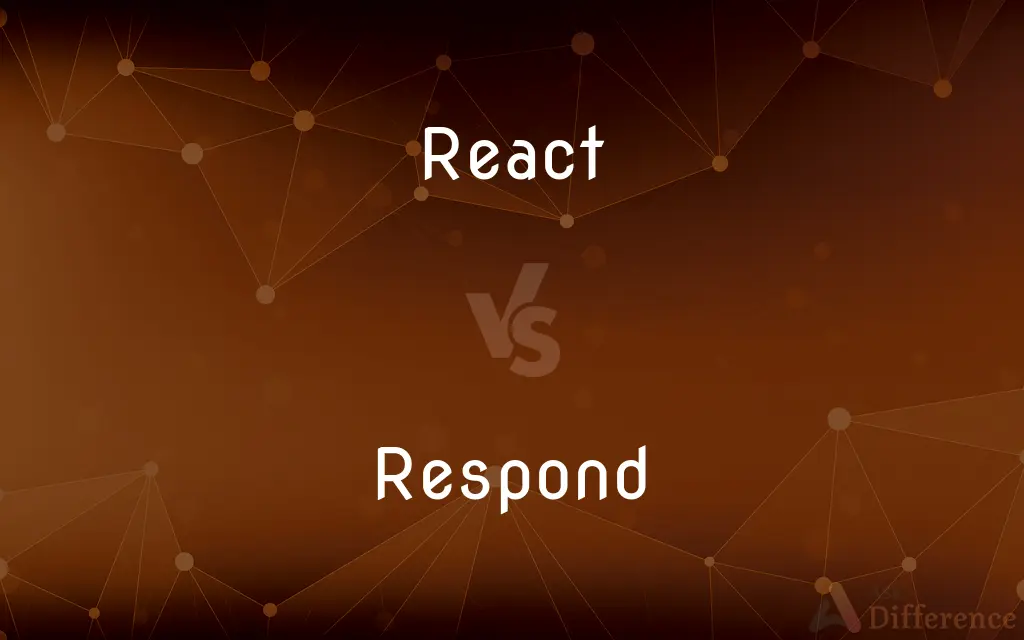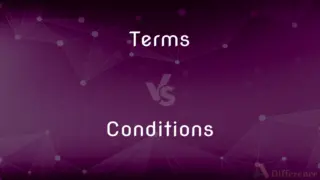React vs. Respond — What's the Difference?

Difference Between React and Respond
ADVERTISEMENT
Compare with Definitions
React
To act in response to or under the influence of a stimulus or prompting
Reacted strongly to the sarcastic tone of the memorandum.
Respond
A respond is a half-pier or half-pillar which is bonded into a wall and designed to carry the springer at one end of an arch.
React
To act in opposition to a former condition or act
Composers who reacted against romanticism.
Respond
To make a reply; answer
Respond to an email.
React
To act reciprocally or in return.
ADVERTISEMENT
Respond
To act in return or in answer
Firefighters responding to a call.
React
(Chemistry) To undergo a reaction
Methane reacts with hydroxyl to produce formaldehyde.
Respond
To react to a stimulus or to a treatment, especially in a favorable way
Tumors that responded to radiation.
React
To cause (a substance or substances) to undergo a reaction.
Respond
To give as a reply; answer.
React
(intransitive) To act in response.
How did she react to the news?
Respond
A pilaster or half-pier engaged to a wall and carrying one end of an arch or groin, often at the end of an arcade.
React
To act or perform a second time; to do over again; to reenact.
Respond
To say something in return; to answer; to reply.
To respond to a question or an argument
React
To return an impulse or impression; to resist the action of another body by an opposite force
Every body reacts on the body that impels it from its natural state.
Respond
(intransitive) To act in return; to carry out an action or in return to a force or stimulus; to do something in response.
React
To act upon each other; to exercise a reciprocal or a reverse effect, as two or more chemical agents; to act in opposition.
Respond
(ambitransitive) To correspond with; to suit.
React
To cause chemical agents to react; to cause one chemical agent to react with another.
Respond
(transitive) To satisfy; to answer.
The prisoner was held to respond the judgment of the court.
React
To post a reaction icon or emoji indicating how one feels about a posted message.
Respond
(intransitive) To be liable for payment.
React
(Internet) An emoji used to express a reaction to a post on social media.
Sad reacts only
Respond
A response.
React
To act or perform a second time; to do over again; to reenact; as, to react a play; the same scenes were reacted at Rome.
Respond
A versicle or short anthem chanted at intervals during the reading of a lection.
React
To return an impulse or impression; to resist the action of another body by an opposite force; as, every body reacts on the body that impels it from its natural state.
Respond
(architecture) A half-pillar, pilaster, or any corresponding device engaged in a wall to receive the impost of an arch.
React
To act upon each other; to exercise a reciprocal or a reverse effect, as two or more chemical agents; to act in opposition.
Respond
To say somethin in return; to answer; to reply; as, to respond to a question or an argument.
React
Show a response or a reaction to something
Respond
To show some effect in return to a force; to act in response; to accord; to correspond; to suit.
A new affliction strings a new cord in the heart, which responds to some new note of complaint within the wide scale of human woe.
To every theme responds thy various lay.
React
Undergo a chemical reaction; react with another substance under certain conditions;
The hydrogen and the oxygen react
Respond
To render satisfaction; to be answerable; as, the defendant is held to respond in damages.
React
Act against or in opposition to;
She reacts negatively to everything I say
Respond
To answer; to reply.
Respond
To suit or accord with; to correspond to.
For his great deeds respond his speeches great.
Respond
An answer; a response.
Respond
A short anthem sung at intervals during the reading of a chapter.
Respond
A half pier or pillar attached to a wall to support an arch.
Respond
Show a response or a reaction to something
Respond
Reply or respond to;
She didn't want to answer
Answer the question
We answered that we would accept the invitation
Respond
Respond favorably or as hoped;
The cancer responded to the aggressive therapy
Share Your Discovery

Previous Comparison
Terms vs. Conditions
Next Comparison
Penance vs. Penitence















































